
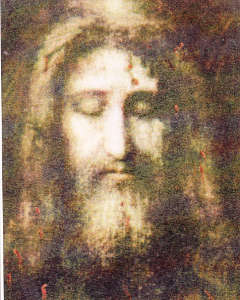
History

"The Carmelites trace their origin back to the prophet Elias. He is regarded by them, and the Church accepts him, as their Founder. In the lessons of the Office for his feast, the Church herself declares that Elias was the Founder of the Order." – Pope Benedict XIV, Treatise on the Beatification of Servants of God and the Canonisation of the Blessed
According to a constant tradition in the Carmelite Order which has been preserved, both in the Liturgy of the Church and in the “Book of the Institution of the First Monks,” the Order of Carmel was founded by the Prophet Elias in the 9th century BC. At that time, the people of Israel, under the influence of wicked kings and queens, had fallen into idolatry. Many attempted to combine the worship of the true God with the worship of idols. For 3 years and 6 months a terrible drought had afflicted the land of Israel – a visible symbol of the moral and spiritual decadence of the chosen race. Upon the sacred slopes of Mt. Carmel, full of zeal for the glory of God, Elias challenged them:
This challenge is as relevant today. The Carmelite, by his or her commitment to a prayerful and austere manner of life, presents a similar, though silent, challenge to the modern world. Our God is a living God. He is our Creator, our Father and our Redeemer who deserves to be honoured and loved with all our mind, heart, soul and strength. In the face of this reality, what response has He received? What will your response be?
Fire from Heaven
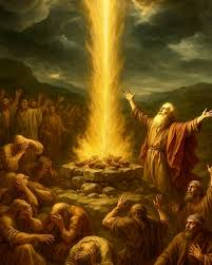 The account of how Elias defeated the 450 priests of Baal can be read in the 18th Chapter of the Third Book of Kings. Fire fell from Heaven, at his request, demonstrating to all the people the power of the true God of Israel and the powerlessness of their false gods. The marvels accomplished in a visible manner in that great victory upon Mt. Carmel are still accomplished in a spiritual manner in this 21st Century. Fire still falls from Heaven today - the fire of Divine Love - wherever it finds a heart prepared to serve God above all. The idols of today are less obvious, perhaps; but it is no exaggeration to say that idolatry is still rampant. Our idols are any person, object, project, plan or pursuit which claims from us that worship of mind and heart which is due to God alone. It is the duty of every Christian, and still more so for the Carmelite, to offer to God the complete gift of oneself; to counteract and resist the seductive influence of these modern idols by prayer and penance. By accomplishing as perfectly as possible, for God’s sake, the duties of our state in life, we enable Him to use us accomplish great things for souls. Just as Elias defeated the false prophets of Baal, so every Christian must wage war against the passions and temptations which attempt to divert us from becoming the saints God has called us to be.
The account of how Elias defeated the 450 priests of Baal can be read in the 18th Chapter of the Third Book of Kings. Fire fell from Heaven, at his request, demonstrating to all the people the power of the true God of Israel and the powerlessness of their false gods. The marvels accomplished in a visible manner in that great victory upon Mt. Carmel are still accomplished in a spiritual manner in this 21st Century. Fire still falls from Heaven today - the fire of Divine Love - wherever it finds a heart prepared to serve God above all. The idols of today are less obvious, perhaps; but it is no exaggeration to say that idolatry is still rampant. Our idols are any person, object, project, plan or pursuit which claims from us that worship of mind and heart which is due to God alone. It is the duty of every Christian, and still more so for the Carmelite, to offer to God the complete gift of oneself; to counteract and resist the seductive influence of these modern idols by prayer and penance. By accomplishing as perfectly as possible, for God’s sake, the duties of our state in life, we enable Him to use us accomplish great things for souls. Just as Elias defeated the false prophets of Baal, so every Christian must wage war against the passions and temptations which attempt to divert us from becoming the saints God has called us to be.
Promise of Salvation
 After his great victory over the false prophets, Elias “went up to the top of Mt. Carmel, and casting himself down upon the earth put his face between his knees.” He persevered in prayer, and sent his servant seven times to look toward the sea and see if there was any sign of rain. Elias, never wavering in his confidence, received the good news after the seventh time: “Behold, a little cloud arose out of the sea like a man’s foot.” Soon thereafter, torrential rains fell upon the parched land and the people of Israel were saved. Elias saw this cloud as a prophetic symbol of the Virgin mentioned in the prophecies of Isaias. Even as this cloud brought temporal salvation to the Israelites, so the Blessed Virgin Mary would bring eternal salvation to mankind by becoming the Mother of our Saviour.
After his great victory over the false prophets, Elias “went up to the top of Mt. Carmel, and casting himself down upon the earth put his face between his knees.” He persevered in prayer, and sent his servant seven times to look toward the sea and see if there was any sign of rain. Elias, never wavering in his confidence, received the good news after the seventh time: “Behold, a little cloud arose out of the sea like a man’s foot.” Soon thereafter, torrential rains fell upon the parched land and the people of Israel were saved. Elias saw this cloud as a prophetic symbol of the Virgin mentioned in the prophecies of Isaias. Even as this cloud brought temporal salvation to the Israelites, so the Blessed Virgin Mary would bring eternal salvation to mankind by becoming the Mother of our Saviour.
Carmel: the Order of Mary
 Many men from the “schools of the prophets,” inspired by the example of Elias, also began to lead an austere eremitic life. When Elias was taken up into heaven in a fiery chariot, he left his mantle and his “double spirit” to the Prophet Eliseus, whom the “sons of the prophets” looked up to as their spiritual leader. Throughout the centuries, prophets and hermits continued to inhabit the holy mountain of Carmel and prayed for the coming of the much awaited Virgin who would become the mother of the Messias. There is a beautiful tradition recorded in the office of Our Lady of Mount Carmel on July 16th according to which some of the inhabitants of the holy mountain, having come down to Jerusalem at the time of the descent of the Holy Ghost upon the Apostles, made the acquaintance of the Mother of God, were converted to Christianity, and, returning to their solitude, erected the first chapel in her honour. The order of Carmel has ever since been the order of Mary. From this time the hermits became known as Brothers of the Blessed Mary of Mount Carmel, although many centuries were to pass before they formed a properly organised religious community, such as we know them today.
Many men from the “schools of the prophets,” inspired by the example of Elias, also began to lead an austere eremitic life. When Elias was taken up into heaven in a fiery chariot, he left his mantle and his “double spirit” to the Prophet Eliseus, whom the “sons of the prophets” looked up to as their spiritual leader. Throughout the centuries, prophets and hermits continued to inhabit the holy mountain of Carmel and prayed for the coming of the much awaited Virgin who would become the mother of the Messias. There is a beautiful tradition recorded in the office of Our Lady of Mount Carmel on July 16th according to which some of the inhabitants of the holy mountain, having come down to Jerusalem at the time of the descent of the Holy Ghost upon the Apostles, made the acquaintance of the Mother of God, were converted to Christianity, and, returning to their solitude, erected the first chapel in her honour. The order of Carmel has ever since been the order of Mary. From this time the hermits became known as Brothers of the Blessed Mary of Mount Carmel, although many centuries were to pass before they formed a properly organised religious community, such as we know them today.
Development of Christian Monasticism
 Christian monasticism developed in the 3rd-4th century Egyptian desert as a radical call to prayer and asceticism. It evolved from the solitary hermit life of St. Paul the First Hermit and the semi-eremitic Lavra inspired by St. Anthony the Great, to the disciplined community life of the coenobium founded by St. Pachomius. The Rule of St. Basil and the writings of John Cassian also paved the way for the Rule of St. Benedict, with its strong emphasis on community life, which soon became the blueprint for Western Monasticism. However, when St. Patrick planted the seeds of monasticism in Ireland, it appears that he drew his inspiration from the Egyptian lavra rather than the larger coenobiums established by St. Pachomius. A lavra consisted of a cluster of individual hermit cells or caves scattered around a desert area, often centred on a common church, bakery, and water source. The monks lived in solitude from Sunday evening through Friday, dedicating themselves to prayer, manual labour (like weaving baskets or mats), and ascetic practices. They gathered only on Saturdays and Sundays for the communal liturgy, a shared meal, and to receive spiritual instruction and supplies. In Ireland, the caves of the Egyptian deserts were replaced by “clocháns” (beehive-shaped stone huts) clustered within an enclosure, as may still be seen in places like Skellig Michael or Glendalough. Remote seacoasts and islands became the desert of the Irish monks where they encountered the same solitude and struggle with the elements as their brethren in Egypt and Palestine.
Christian monasticism developed in the 3rd-4th century Egyptian desert as a radical call to prayer and asceticism. It evolved from the solitary hermit life of St. Paul the First Hermit and the semi-eremitic Lavra inspired by St. Anthony the Great, to the disciplined community life of the coenobium founded by St. Pachomius. The Rule of St. Basil and the writings of John Cassian also paved the way for the Rule of St. Benedict, with its strong emphasis on community life, which soon became the blueprint for Western Monasticism. However, when St. Patrick planted the seeds of monasticism in Ireland, it appears that he drew his inspiration from the Egyptian lavra rather than the larger coenobiums established by St. Pachomius. A lavra consisted of a cluster of individual hermit cells or caves scattered around a desert area, often centred on a common church, bakery, and water source. The monks lived in solitude from Sunday evening through Friday, dedicating themselves to prayer, manual labour (like weaving baskets or mats), and ascetic practices. They gathered only on Saturdays and Sundays for the communal liturgy, a shared meal, and to receive spiritual instruction and supplies. In Ireland, the caves of the Egyptian deserts were replaced by “clocháns” (beehive-shaped stone huts) clustered within an enclosure, as may still be seen in places like Skellig Michael or Glendalough. Remote seacoasts and islands became the desert of the Irish monks where they encountered the same solitude and struggle with the elements as their brethren in Egypt and Palestine.
Rule of St. Albert
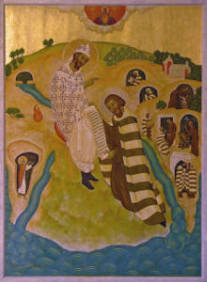 Around 1206 many former crusaders who wished to pursue a holy war of a different kind joined the hermits on Mt. Carmel, and the need was felt for a more organised structure. Accordingly, some of these hermits requested a formal "rule of life" from St. Albert of Jerusalem (Albert Avogadro), who was the Latin Patriarch of Jerusalem and a noted canon lawyer. This rule received formal papal confirmation in 1226 by Pope Honorius III, and was again confirmed, with slight modifications, by Pope Innocent IV in 1247. It was precisely about this time that the Muslim invasion of the Holy Land forced the Carmelites to take refuge in Europe. While the hermits were encountering a great deal of opposition from Western monks who considered their Eastern manner of life and dress to be out of place, Our Lady appeared to St. Simon Stock in 1251, giving him the brown scapular and a promise of salvation to all who would die clothed in this garment. This pledge of Mary’s special favour and protection was an immense consolation and help to the Carmelites, and so it has remained to this day. In 1362, Our Lady of Mt Carmel appeared once again with an additional consoling promise and message of hope. She said to St. Peter Thomas, the Papal legate to the East: "Have confidence, Peter, for the Carmelite Order will last until the end of the world. Elias, its founder, obtained this from my Son."
Around 1206 many former crusaders who wished to pursue a holy war of a different kind joined the hermits on Mt. Carmel, and the need was felt for a more organised structure. Accordingly, some of these hermits requested a formal "rule of life" from St. Albert of Jerusalem (Albert Avogadro), who was the Latin Patriarch of Jerusalem and a noted canon lawyer. This rule received formal papal confirmation in 1226 by Pope Honorius III, and was again confirmed, with slight modifications, by Pope Innocent IV in 1247. It was precisely about this time that the Muslim invasion of the Holy Land forced the Carmelites to take refuge in Europe. While the hermits were encountering a great deal of opposition from Western monks who considered their Eastern manner of life and dress to be out of place, Our Lady appeared to St. Simon Stock in 1251, giving him the brown scapular and a promise of salvation to all who would die clothed in this garment. This pledge of Mary’s special favour and protection was an immense consolation and help to the Carmelites, and so it has remained to this day. In 1362, Our Lady of Mt Carmel appeared once again with an additional consoling promise and message of hope. She said to St. Peter Thomas, the Papal legate to the East: "Have confidence, Peter, for the Carmelite Order will last until the end of the world. Elias, its founder, obtained this from my Son."
Carmelite Reforms
 In the terrible schism that afflicted the Church in the fifteenth century, Carmel, along with the other religious orders, went through its period of relaxation so that its Rule was finally mitigated. From this period until St. Teresa of Avila’s time, there was always a marked tendency in the order to bring it back to its primitive fervour, and the more zealous among the Carmelites attempted a number of reforms, such as the Reform of Touraine, with limited success. It was, however, reserved to Avila's great Saint to bring about a complete reformation of Carmel's beautiful Order. If ever there was a noble soul in God's Church, it was certainly that of the incomparable St. Teresa. She, a poor weak woman, did what Chapters had tried in vain to accomplish. Inspired by the Book of the Institution of the First Monks, and assisted by St. John of the Cross, she accomplished a complete reform in both the male and female branches of the order of Carmel.
In the terrible schism that afflicted the Church in the fifteenth century, Carmel, along with the other religious orders, went through its period of relaxation so that its Rule was finally mitigated. From this period until St. Teresa of Avila’s time, there was always a marked tendency in the order to bring it back to its primitive fervour, and the more zealous among the Carmelites attempted a number of reforms, such as the Reform of Touraine, with limited success. It was, however, reserved to Avila's great Saint to bring about a complete reformation of Carmel's beautiful Order. If ever there was a noble soul in God's Church, it was certainly that of the incomparable St. Teresa. She, a poor weak woman, did what Chapters had tried in vain to accomplish. Inspired by the Book of the Institution of the First Monks, and assisted by St. John of the Cross, she accomplished a complete reform in both the male and female branches of the order of Carmel.
Carmel Today
 Sadly, today in our post Vatican II era, we are witnessing once again a return of decadence and relaxation of Rules and customs in many of the major Religious Orders, Carmel being no exception. The spirit of the world and of modernism has caused many thousands of priests and religious to depart more and more from the spirit of their holy vocation and from that life of dedication to Jesus Christ which every Christian is bound to observe, according to their state in life. Now, more than ever, generous souls are needed to revive the ancient spirit of Carmel.
Sadly, today in our post Vatican II era, we are witnessing once again a return of decadence and relaxation of Rules and customs in many of the major Religious Orders, Carmel being no exception. The spirit of the world and of modernism has caused many thousands of priests and religious to depart more and more from the spirit of their holy vocation and from that life of dedication to Jesus Christ which every Christian is bound to observe, according to their state in life. Now, more than ever, generous souls are needed to revive the ancient spirit of Carmel.
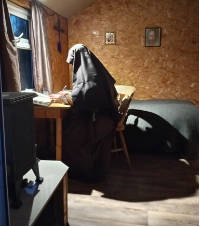
In our humble Carmelite foundation, located in the beautiful solitary and peaceful hills of West County Cork, we are attempting to do exactly that. Having discovered the benefits and value of a solitary life, as well as the advantages offered by community life, our semi-eremitic observance closely resembles that of our forefathers on Mt. Carmel and the early Celtic monks, hermits and consecrated nuns. Like them, we occupy separate cells built a short distance from one another and linked by footpaths, while coming together in our main building several times a day for Community exercises.
“In addition, you are all to have separate cells, arranged as may be indicated by the lie of the land you propose to occupy…” – Holy Rule of St. Albert
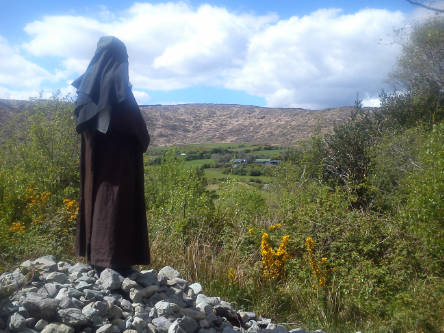
This arrangement is very similar to the desert lavras of Palestine, Egypt, and Syria, and to the flourishing medieval 6th–9th century Irish monasteries with their individual beehive-shaped cells (clocháns). It allows for greater silence and solitude than is possible in coenobitic life, and in this respect it differs from the way of life established by St. Teresa in the Discalced Reform. Physical solitude, silence, manual labour and prayerful Lectio Divina provide the ideal atmosphere for the contemplative life to develop and for the soul to complete the gift of herself to God. At the same time, very few are called to live in total solitude. Human beings are naturally social creatures, and experience proves that there is an abundance of benefits to be derived from community life, where one has the advantage of support and encouragement from one’s fellow religious. In addition, the common life offers more abundant opportunities for practising humility and charity than are typically found by the hermit. For this reason, our daily timetable provides for a healthy balance of solitude and community life, thus uniting and preserving all that is best in the sacred traditions of Carmel and of monasticism in general.